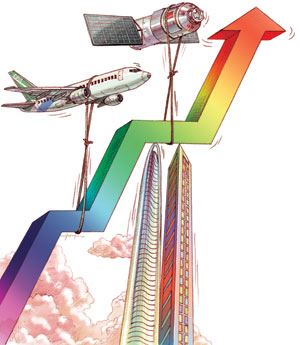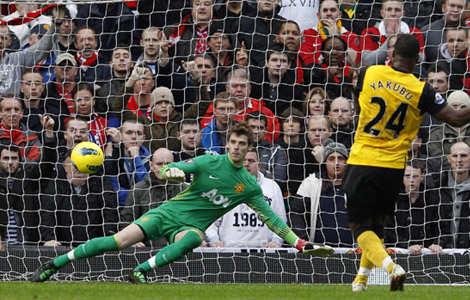Bold statements building lasting legacy
Updated: 2012-01-04 08:30
By Andrew Moody (China Daily)
|
|||||||||||
Big ticket, new projects help China establish a permanent footprint on global center stage
 |
|
From left: A photo taken by the submersible Jiaolong at a depth of 5,000 meters; China's first space lab module Tiangong-1 is ready for long-term operation; the 1,800-seat Guangzhou Opera House. [Photos Provided to China Daily] |
BEIJING - Do countries need large-scale projects to announce their arrival on the world stage as a major economic force?
China is currently investing billions on major infrastructure development, groundbreaking architectural projects and in science and technology in such fields as space exploration, supercomputers and robotics.
The world's second-largest economy is not the first nation to make such bold statements.
Even the Greeks, when building the Parthenon in the 5th century BC, wanted to create something that would be a lasting legacy of their society.
The British celebrated their success as the world's predominant industrial and economic power by building a great Crystal Palace in Hyde Park in 1851 to exhibit the country's industrial achievements.
The United States announced its emerging economic power with the construction of vast skyscrapers, such as the 102-story Empire State Building, which after being completed in 1931 was the world's tallest building for 40 years.
The US also made what was arguably the most impressive scientific achievement of all time, landing a man on the moon in July 1969.
Some say that China's recent investment in major projects has been excessive and has led to heavy local government debt.
China's National Audit Office reported last June that local government debt had reached $1.7 trillion, about 27 percent of the country's gross domestic product.
One major question, however, is whether big projects are just a country showing off its new status in the world or an inevitable by-product of being a strong economic force.
Martin Jacques, a British academic, journalist and author of When China Rules the World, which argues that China will become the dominant power in the 21st century, believes all emerging societies like to put themselves on the map with big projects.
"It goes with the territory and is not just reducible to some prestige or reputational purpose," he said.
China has undertaken a number of great projects in the early 21st century.
Notable examples are the world's longest cross-sea bridge, 36 kilometers spanning Jiaozhou Bay of Qingdao in East China's Shandong province, and the 606-meter skyscraper in Wuhan, the capital of Hubei province, which on completion will be the world's third-tallest building.
The country has built 1,000 km of high-speed railway from Wuhan to Guangzhou, reducing the traveling time between the two cities from 11 to just three hours.
Another major project is 1,800-seat Guangzhou Opera House designed by the British-Iraqi architect Zaha Hadid at a cost of 1.38 billion yuan ($218 million).
The nation is joining in competition with Airbus and Boeing with its C919 airliner, being built by the Commercial Aircraft Corporation of China, which is set to take to the skies in 2014.
China also plans to have its first manned space station orbiting Earth by 2020.
And in the oceans, the Jiaolong submersible, named after the mythical Chinese sea dragon, is expected to dive to 7,000 meters beneath the surface within the next 12 months.
China has made major breakthroughs in supercomputers, developing the world's most advanced machine - the Tianhe-1A - capable of doing 2.5 thousand trillion calculations a second.
|
 |
Ian Morris, professor of history and fellow of the Archaeology Center at Stanford University in California, and author of Why the West Rules - for Now, on the New York Times list of the 100 most notable books of the year, says major societies throughout history have wanted to make statements of themselves.
"One of the most famous examples was in ancient Athens. There were big debates at that time as to whether to build the Parthenon and the temples on the Acropolis," he says.
"One of the arguments that swayed the issue was the lack of anything impressive in Sparta (the rival Greek state). It was felt that if it fell to the ground, nobody would be impressed by the ruins because there would be nothing there. They wanted to build something that people in many ages to come would understand and think what an incredible place it must have been."
A major issue about large-scale projects and infrastructure is that they are a fragile driver of economic development.
China's fast economic growth over the past 15 years has largely been fueled by exports and investment in big projects such as the construction of roads and airports.
The government recognizes this, and that is why so much emphasis has been placed on boosting domestic consumption in the 12th Five-Year Plan (2011-2015).
The national auditor's report highlighting local government debt was seen as a warning light for restraint.
George Magnus, senior economic adviser at Swiss bank UBS, echoed the warning about China's debt, in his book, Uprising: Will Emerging Markets Shape or Shake the World Economy?
He argued that China's internal borrowing would eventually hamper its growth since the projects would not generate the returns to repay the loans.
"There was an example I cited in my book, somewhat tongue in cheek, about someplace way out in the west (of China) where they were building a huge tower with a revolving restaurant despite the population within a 50 mile radius being relatively small. When you look at constructions like this, it doesn't make a lot of sense," he says.
But he adds:"As an economist, you can be critical of the expenditure on and financing of these kind of projects. But from a human point of view, you think, 'Yes, why not?' It is just a natural thing for people to show off their prowess and prosperity."
Jacques believes the Beijing Olympics in 2008 demonstrated this prowess.
"The Bird's Nest (the Games' main stadium) is one of the most iconic buildings in the world. It is beautiful," he says.
"I think the Olympics was a relatively harmless expression of rising power, compared to military hardware, which was the main expression of the rise of America after World War II."
One of the technological areas where China is attracting a lot of attention is its space program.
Space exploration seems to have lost some of its excitement since man walked on the moon in July 1969.
China intends to have a manned space station in orbit by the end of the decade.
"Every major country wants to develop a space program. It represents a culmination of its achievements in science and technology as well as economic fields," says Hu Wenrui, professor and academician at the Chinese Academy of Sciences in Beijing, and one of China's leading space physicists.
"The space station will demonstrate to people around the world the ingenuity and perseverance of the Chinese people. It will also be a solid platform to move forward to other areas of space exploration."
Derek Han, a Chinese-American and an international concert pianist, believes some of China's large projects are major statements of its arrival on the world stage.
He cites the National Center for Performing Arts, the Beijing concert hall, known as the "Egg" and designed by the French architect Paul Andreu, which opened shortly before the Olympics.
"From an artist's point of view, it is absolutely mind-blowing, the facilities, the structure, the acoustics are of a different order," he says.
Han, who is also chairman of North Square Blue Oak, a research and investment company with offices in Beijing and London, believes China has demonstrated it has the capability to stage major events such as the Olympics that other countries are in awe of.
"You look at the nervousness with which London is preparing for the Olympics with the creaking public transport system that it has," he says.
As for architecture, many say that despite widespread urban construction projects, it would be wrong to characterize China as being all about big flashy buildings.
Ole Scheeren, the German architect who designed the futuristic CCTV tower - two towers that meet in an arch - in Beijing's central business district, says Chinese planners want to tackle new ideas head on and have discussions about what Chinese modernity really means.
"I think an element of it is dedicated to progress and a future which surpasses the limits and boundaries of an entirely risk-averse Western culture," he says.
Scheeren, who runs his own architecture practice in the city, Buro Ole Scheeren, says the authorities have avoided putting up skyscrapers everywhere.
"I think it is important that a city consists not only of a few so-called landmark buildings, but also a generic mass and substance," he says.
Zaha Hadid, the British Iraqi architect, who designed the Guangdong Opera House, which took five years to build, agrees that Chinese authorities really want to engage with new ideas.
"They are very updated in their approach. They don't want you do something you have done 10 or 15 years ago. They want something fresh and new, something that connects to the situation in the country now."
Jacques believes China still retains the energy to make statements through major projects, unlike Western countries.
"Europe is not trying to make a statement. It has become very introverted. It has moved into a navel-contemplating stage and is very smug and complacent about itself. China is still in the teenage phase," he says.
- Measures to boost buying amid export decline
- China protests islands visit by Japan
- China to play greater role in 2012
- China axes TV entertainment shows
- New Year's art starts controversy
- Taliban to set up office in Qatar
- Man used fake Wendi Deng Twitter
- CPI to ease further this year despite inflation
Hot Topics
Kim Jong-il, Mengniu, train crash probe, Vaclav Havel, New Year, coast guard death, Internet security, Mekong River, Strait of Hormuz, economic work conference
Editor's Picks

|

|

|

|

|

|







